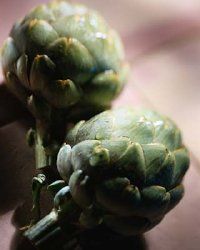Memory problems can be licked by good nutrition and a healthy amount of mental exercise. The following home remedies will help improve your recall dramatically.
Home Remedies from the Cupboard
Pistachio nuts. If your memory loss is the result of a thiamine deficiency, pistachio nuts can help. One of the richest sources of thiamine, 1/2 cup supplies 0.54 mg of thiamin. The RDA for thiamine is 1.5 mg for men and 1.1 for women age 50 and younger; slightly less for those over 50.
Wheat germ. Wheat germ is a good source of vitamin E, which may help with age-related memory loss.
Home Remedies from the Drawer
Paper. Chart a food plan, then keep a diary. Some foods enhance mental powers, some do not. And some even make mental powers sluggish. So, to find out your best food choices and combinations, chart your choices and reactions.
Utensils. You know what's supposed to be there, right? A whisk, a wooden spoon, a rolling pin, measuring cups. Chances are, your utensil drawer hasn't changed for years, so this is a great place to conduct a memory exercise. Take a good look, tidy the drawer to remind you what's there, then ask a friend or loved one to remove an item or two. Tomorrow, take a good look, tidy the drawer again, and see what's missing. This exercise will not only keep your memory on its toes, it will also keep that drawer in perfect order.
Home Remedies from the Kitchen Table
The morning paper. Sit, relax, and turn to the crossword puzzle. This is a great way to exercise your brain and jog your memory.
Recipe box. Memory is jogged by familiarity. Sit down at the table, relax, and think about a few favorite and familiar recipes. Try to recreate them from memory, and jot them down. Do the same tomorrow and the following days, with the same recipes, and compare your results.
Home Remedies from the Refrigerator
Artichokes. These are thought to increase your mental acuity. Prepare and eat them as you normally would or follow this recipe for an elixir of artichoke: Pull the artichoke apart, leaf by leaf, then put the pieces into a jar and add enough water to just barely cover. Cover the jar with a lid or saucer, and place in a pan with water. Boil for two hours, adding more water to the pan (not the jar) as necessary. Then strain the contents of the jar and give the artichoke leaves a good squeeze to get out all the juices. Take 3 to 4 tablespoons four times a day.
Blueberries. These luscious little fruits are the richest source of antioxidants, and recent studies have shown that blueberries may help improve short-term memory.
Carrots. They contain carotene, which is a memory booster. Eat them raw, cooked, or in casseroles, or make a juice with carrots and apricots. The apricots are used to add a little compatible juice to the dry carrots.
Eggs. These have lecithin, which keeps the memory nerve cells healthy. Lecithin is also found in sunflower and soybean oils and can be purchased in capsule form, too. Studies indicate that taking up to 70 grams a day may improve memory.
Okra. If not a memorable food, this is at least a memory-enhancing food. So are sweet potatoes, tapioca, and spinach. Fresh fruits, especially oranges, and vegetables, almonds, and milk are also good for stimulating the memory.
Home Remedies from the Spice Rack
Herbal teas. Any of these will help a weak memory: sage, rosemary, marjoram, basil. Use 1/4 teaspoon in a cup of boiling water. Steep for five minutes. These herbs, in an essential oil, can be added to olive oil and massaged over the neck and forehead. Add these oils to bath water, too: 5 drops to a tubful.
Home Remedies from the Supplement Shelf
Vitamin B6. A deficiency in this vitamin, also called pyridoxine, can cause memory loss. Supplementation may improve memory in older adults.
Vitamin E. Recent studies have reported improved short-term memory in older adults who took supplemental vitamin E.
More Do's & Don'ts
More Do's & Don'ts
- Write it down. Post notes. Keep lists. Mark it on the calendar.
- Exercise. This stimulates circulation, which is good for the brain.
- Meditate. The more you worry about memory loss, the more apt you are to suffer from it. Relax and think about other, more pleasant things.
Don't forget to use these simple effective home remedies to improve your memory.
To learn more about how the brain works and disorders associated with memory problems, try the following links:
ABOUT THE AUTHORS:
Linnea Lundgren has more than 12 years experience researching, writing, and editing for newspapers and magazines. She is the author of four books, including Living Well With Allergies.
Michele Price Mann is a freelance writer who has written for such publications as Weight Watchers and Southern Living magazines. Formerly assistant health and fitness editor at Cooking Light magazine, her professional passion is learning and writing about health.
ABOUT THE CONSULTANT:
David J. Hufford, Ph.D., is university professor and chair of the Medical Humanities Department at PennsylvaniaState University's College of Medicine. He also is a professor in the departments of Neural and Behavioral Sciences and Family and Community Medicine. Dr. Hufford serves on the editorial boards of several journals, including Alternative Therapies in Health & Medicine and Explore.
This information is solely for informational purposes. IT IS NOT INTENDED TO PROVIDE MEDICAL ADVICE. Neither the Editors of Consumer Guide (R), Publications International, Ltd., the author nor publisher take responsibility for any possible consequences from any treatment, procedure, exercise, dietary modification, action or application of medication which results from reading or following the information contained in this information. The publication of this information does not constitute the practice of medicine, and this information does not replace the advice of your physician or other health care provider. Before undertaking any course of treatment, the reader must seek the advice of their physician or other health care provider.

